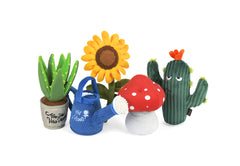Image Source: Unsplash
No matter their age, size, and/or breed, dogs have plenty of personality. But just like humans, the personality and demeanor of individual dogs can vary significantly. Some dogs are content in the follower role, obeying your every command and submitting to most other animals.
Other dogs are decidedly more dominant, taking on a sort of leadership role at an early age. While alpha behavior is primarily a natural occurrence, dominant dogs may be more prone to aggression and subsequent negative behavior. Excessive barking and snarling, for example, can lead to serious issues with people and other animals, as well as possible legal action if your dog bites someone.
As a responsible dog owner, it’s important that you learn to recognize potentially problematic alpha behavior and address those issues early on. Further, taking on the role of pack alpha yourself could help curb aggression and give you peace of mind, especially if you own a guard dog or if your rescue pup has a history of abuse. It’s just as important to understand the various situations that could lead to alpha behavior. Here’s what you need to know.
What Is Alpha Behavior?
Even the friendliest dogs can exhibit alpha behavior in certain situations, such as when they feel agitated or threatened in some way. Generally speaking, dogs excel at communicating via body language, and you should be able to spot when a dog is stressed. Visual cues that indicate aggression include muscle tension, raised patches of fur, laid-back ears, and slow movements.
Alpha dogs are also more likely to hold your gaze rather than look away when they feel stressed, giving them a greater feeling of control over the situation. In social settings, you can identify dominant dogs by behavior such as mounting other dogs and being aloof rather than playful.
Yet alpha behavior isn’t necessarily synonymous with aggression. In fact, dominance is a natural trait that’s essential for survival in the wild, and having an alpha to serve as head of the pack improves chances of survival for every member. And just because dogs have been domesticated for thousands of years doesn’t mean that they have lost their natural instincts.
Even in domestic settings, dogs develop a pack order, wherein various members of the pack are self-designated alpha, omega, or beta. Within domestic packs containing multiple species, from humans to dogs and cats, a nearly infinite amount of potential configurations exist. Within the diverse households of the world, plenty of felines enjoy the alpha position, and some humans are even assertive enough to serve as pack leader.
The Dominance Factor of Different Breeds
It should be noted, however, that a handful of dog breeds are more commonly associated with alpha behavior than others. Among the world’s most dominant dog breeds are stereotypical entries like the American bulldog, but there are also some unlikely contenders. Both the Jack Russell terrier and Siberian husky will test your boundaries every chance they get. What’s more, huskies are fiercely independent and are said to only follow commands from their pack leader.
But breed considerations are just one of the myriad possible reasons behind alpha behavior. Rescue dogs are of particular note in this regard, as they may have lived for a period of time in an unsafe or hostile environment. For dogs that have been abused, used as bait dogs in illegal fighting groups, or otherwise mistreated, developing alpha behavior after the fact can be a coping mechanism of sorts.
And depending on a dog’s background and breed, there are various tactics you can use to assert your own dominance. Your tone is a crucial part of the training process as well, and you must avoid using anger or any form of violence to correct negative alpha behavior. Dogs are exceptional at picking up on your emotions, and if you’re angry or frustrated, they may learn to view that type of behavior as acceptable.
Keep in mind that frustration often comes with the territory as you work with aggressive, stressed, or alpha dogs. Don’t hesitate to seek outside assistance if you find yourself unable to effectively assert your dominance. Dog training courses are offered across the nation, to the benefit of both you and your dog.
Dog Behavior Classifications: an Overview
In dog training scenarios, canines are typically assessed during their first session, and categorized accordingly. Animal control professionals also utilize behavior classifications. According to legal professionals, a dog is classified as “dangerous” if they have had at least two separate instances of biting or otherwise causing physical harm to a human or another animal.
Yet dangerous dogs are considered less threatening than “vicious” dogs, or those that have caused serious injury or death to another living creature. The owners of dogs classified as dangerous or vicious may find themselves criminally and/or civilly liable for harm caused by their dog. Even more disturbing, a judge or similar authority figure may order the mandatory euthanasia of a vicious or dangerous canine.
The good news is that your dog’s alpha behavior doesn’t have to escalate to dangerous or vicious levels. But it’s up to you to curb negative behavior before it gets out of hand, and you have plenty of available options to help you along the way. Your alpha dog may benefit from obedience classes, as previously mentioned, or increased socialization at a boarding facility run by trained professionals.
Training Tips and Alternative Methods to Reduce Aggression
In the end, however, you’re the leader of the pack, and the bulk of the training process must happen at home. For particularly stubborn dogs, you may need to assert dominance on a continual basis until you are finally viewed as the pack leader. Incentives such as treats and long runs or walks will help speed up the process.
It’s also important to determine the specific things and situations that agitate or stress out your dog. Some dogs go crazy at the sound of a doorbell, while others seemingly feel threatened by cars or bicyclists. Understanding the nuances of your dog's emotions is an invaluable part of curbing alpha behavior.
In addition, you also need to have some coping skills up your sleeve. Identify the best ways to calm your dog down, whether it’s gentle scritches behind the ear or distraction using a bone or favorite toy. You may also find that certain herbs do wonders for your dog’s temperament. In recent years, CBD oil has emerged as a promising option for alleviating your pet’s anxiety.
When considering CBD, however, you should be aware that laws regarding its legality can vary widely. Regarding the legal status of CBD in the U.S., it largely depends on the source. CBD is a cannabinoid present on both hemp and marijuana plants. Hemp enjoys an elevated legal status when compared to marijuana; the latter contains not only CBD, but also the mind-altering cannabinoid THC.
CBD can also be extracted from marijuana, in which case the resulting CBD product is likely to contain THC — meaning it would not be legal in all states. Under no circumstance should any dog owner give THC to their pet, alpha or not. Moreover, even if the CBD oil is legal in your state because it’s derived from hemp, make sure to consult with your veterinarian before giving it to your dog as a stress reducer. Your vet may be able to offer additional advice, and assist you in finding the appropriate dosage based on your dog’s weight and overall health.
Key Takeaways
Dogs are pack animals, and domestication hasn’t changed that fact. If your dog is struggling with anxiety and aggression, or otherwise exhibiting negative alpha behavior, you need to set clear boundaries. Try to identify stressors in your dog’s life, and use a gentle but firm tone when asserting dominance. Finally, don’t forget that, whatever your dog’s breed or background, you’re the alpha, and you shouldn’t be afraid to firmly embrace that role.
About the Author:
Indiana Lee is a writer and pet lover from the pacific northwest who has a particular interest in covering the arts, social justice, and health. You can follow her work on Contently, or email her at indianaleewrites@gmail.com.








